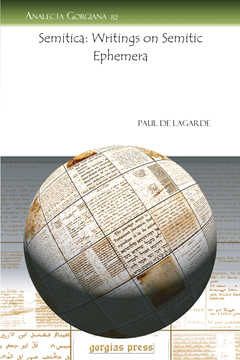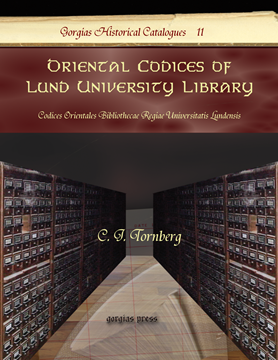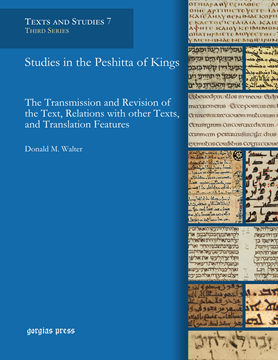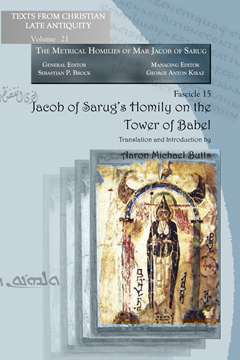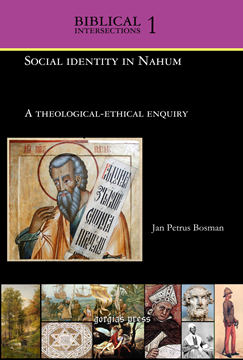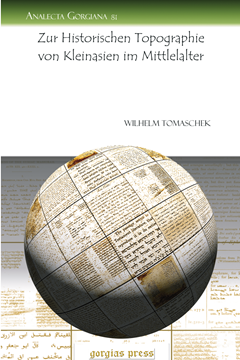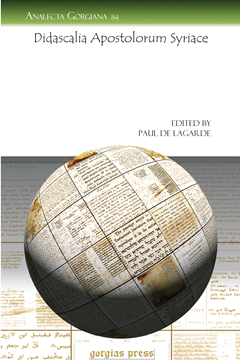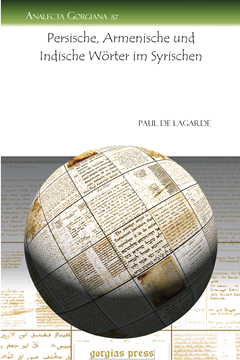Writings on Semitic Ephemera
Series: Analecta Gorgiana 82
ISBN: 978-1-59333-894-7
Originally published in two small volumes of Semitic ephemera written in German, this collection of observations of Paul de Lagarde still contains his cogent insights into the world of Semitic linguistics. Critical remarks on the book of Isaiah introduce his characteristic detail on a number of verses in the prophetic book. The second selection concerns the clarification of Akkadian (Chaldean) words occurring in the Hebrew Bible. In the second major section of the work, de Lagarde presents the leaves of the Septuagint of Codex Sarravianus found in Paris. This annotated Greek material comes from the books of Exodus, Leviticus, and Numbers.
$59.00 (USD) $35.40 (USD)
Oriental Codices of Lund University Library
Codices Orientales Bibliothecae Regiae Universitatis Lundensis
Series: Kiraz Historical Catalogues Archive 11
ISBN: 978-1-59333-893-0
As the title of the volume ably indicates, this historical catalogue is a record of the Oriental codices in the library of the Royal University of Lund. After a brief introduction in Latin he divides the materials into different religious or language groups, beginning with Islamic materials, the largest category. Hebrew, Syriac, and Sabaean codices complete the collection.
$139.00 (USD) $83.40 (USD)
Studies in the Peshitta of Kings
The Transmission and Revision of the Text, Relations with other Texts, and Translation Features
Series: Texts and Studies (Third Series) 7
ISBN: 978-1-59333-853-4
This monograph examines the manuscript variants of the Peshitta (the standard Syriac translation) of Kings, with special attention to the manuscript 9a1. Manuscript 9a1 is of critical importance for the textual history of Kings, and Walter argues that there is overwhelming evidence that the non-9a1 Mss attest to an extensive revision. This monograph also discusses translation features of the Peshitta of Kings with special attention paid to harmonization and the leveling and dissimulation of vocabulary. Walter also treats the vorlage for the translation and treats its relation to the LXX and the Targumim.
$130.00 (USD) $78.00 (USD)
Jacob of Sarug’s Homily on the Tower of Babel
Metrical Homilies of Mar Jacob of Sarug
Translation and Introduction by Aaron Michael Butts
Series: Texts from Christian Late Antiquity 21
ISBN: 978-1-60724-000-6
This edition of Mar Jacob of Sarug's (d. 521) homily on the Tower of Babel develops an extended word-play between “morduto” ‘rebellion’ and “marduto” ‘discipline.’ As is characteristic of Jacob, the characters, their personalities, and their motivations are developed far more than they are in the biblical narrative. The volume constitutes a fascicle of The Metrical Homilies of Mar Jacob of Sarug, which, when complete, will contain the original Syriac text of Jacob's surviving sermons, fully vocalized, alongside an annotated English translation.
$33.00 (USD) $19.80 (USD)
Social identity in Nahum
A theological-ethical enquiry
Series: Biblical Intersections 1
ISBN: 978-1-60724-001-3
Were issues like economic and political oppression, holy wars, resistance literature, hate-speech, xenophobia and other 21st-century realities already present among the civilizations of the ancient Near East? Prophetic literature and specifically the Book of Nahum in the Old Testament provide a unique perspective on these issues. Through Nahum’s moving poetry and disturbing imagery, oppression is verbalised, deep emotion is uncovered and we are given a glimpse of liberation and new hope in times of darkness. This book will sensitize the reader to a better understanding of the identity and dynamics of oppressed groups, both ancient and modern.
$158.00 (USD) $94.80 (USD)
Commentary on the Liturgy of the Syrian Orthodox Church of Antioch
By Ishaq Saka; Translated by Matti Moosa
ISBN: 978-1-60724-002-0
The exposition of the Liturgy of St. James, which is basically the Celebration of the Holy Eucahrist, is most significant for the understanding of the mystery of God in offering His only Son a vicarious sacrifice for the redemption of man. To make it understandable, Rev. Saka explains not only the meaning of terms connected with the liturgy but of all the components of the vessels, the vesting, the censoring, the candles and the propitiatory prayers associated with them. This exposition should benefit both church and liturgical scholars and lay people interested in the profound spiritual meaning of their faith.
$112.00 (USD) $67.20 (USD)
Zur Historischen Topographie von Kleinasien im Mittlelalter
Series: Analecta Gorgiana 81
ISBN: 978-1-59333-856-5
This study considers the topography of Asia Minor during a period of intense historical interest, the era spanning the Crusades. Useful for historians of the Middle Ages and especially those interested in the events surrounding the use of Asia Minor as a bridge to the distant lands of the Holy Land, this brief examination will retain its value. Presenting Turkey as it was seen during the Ottoman period, this topographical history will also appeal to historians of the final days of the empire.
$55.00 (USD) $33.00 (USD)
Didascalia Apostolorum Syriace
Edited by Paul de Lagarde
Series: Analecta Gorgiana 84
ISBN: 978-1-60724-003-7
Published for the first time by Paul de Lagarde in the extant Syriac, this volume reproduces the initial edition of the Didascalia Apostolorum. This important document, which purports to have been written by the apostles is a third-century pseudepigraphon. Presenting a view of the Catholic doctrine as it was believed to have been held by the original apostles, the topics addressed include worship, doctrine, and Christian discipline. For the Syriac scholar wishing to engage a foundational document in the early history of the church, this publication represents an excellent starting point.
$60.00 (USD) $36.00 (USD)
Text and Commentary
Edited by Paul de Lagarde
Series: Analecta Gorgiana 85
ISBN: 978-1-60724-004-4
Lagarde’s edition of the British Museum manuscript of an abridged version of the Geoponica is here made available again for the use of scholars and interested historians. Originally composed by Vindonius Anatolius of Beirut, a fourth-century Greek author, the Geoponica is an example of early natural science, a collection of agricultural tracts. Published here with Lagarde’s Latin commentary on the material from his Gesammelte Abhandlungen, this obscure and difficult text is now available for the first time with the insightful comments of the linguist who edited the Syriac text.
$60.00 (USD) $36.00 (USD)
Persische, Armenische und Indische Wörter im Syrischen
Series: Analecta Gorgiana 87
ISBN: 978-1-60724-006-8
Turning his keen linguistic eye toward various influences on the Syriac language, Lagarde he addresses the various Persian, Armenian, and Indic words that occur in Syriac literature. Arranged alphabetically according to the Syriac spelling of the words, Lagarde ably addresses 222 loan words with frequently detailed entries tracing roots of the words back through their linguistic pedigree. For the scholar of comparative Semitic philology who is interested in the wider background and origins of these specific words, this booklet will prove to be a powerful and much-used tool.
$49.00 (USD) $29.40 (USD)
